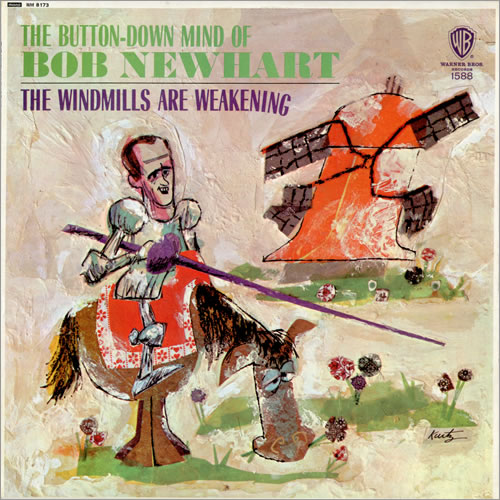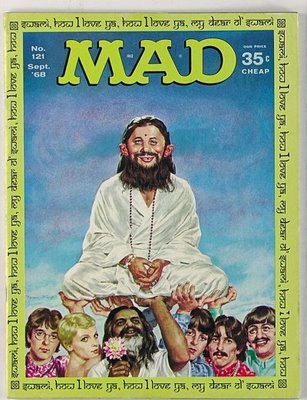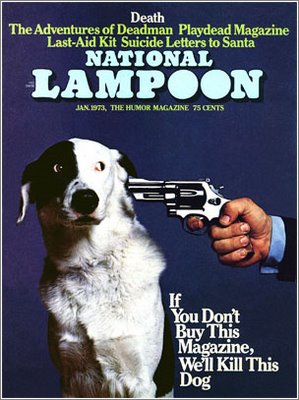Comedy and the Death of God
By:
August 4, 2009

Hey, PhD students looking for a thesis topic — here’s a freebie. These sketchy notes are inspired by a B&N.com review of Thomas Pynchon’s latest novel, Inherent Vice, by HiLobrow.com friend James Parker.
Parker writes:
The ’60s, of course, were a historic low point for humor. I mean humor of the sort enjoyed by people who aren’t a) tenured or b) high, the sort defined by William James as “common sense, dancing.” Categories, hierarchies, proprieties, the basic intuitions of mankind as to its own status and destiny — those things on which humor has traditionally depended were suddenly up in the air, and while there was plenty of inane and liberated laughter to be heard, the sound of the authentic assenting chuckle, of the joke being solidly got, almost died away.
It’s difficult to disagree. Particularly if you agree with me that the Sixties (not to be confused with the 1960s) ran from 1964-73. It’s difficult to disagree, anyway, when you think of humorists whose sensibilities were formed during the Sixties; humorists already in their prime — that is, in their 30s and 40s — during the Sixties are another story.
The following members of the Postmodern Generation were in their 30s and 40s during the Sixties: Johnny Carson, Art Buchwald, Jerry Lewis (who made brilliant movies in the late Fifties, then stopped in ’64 — more evidence that my periodization scheme is correct), Don Rickles, Mel Brooks (whose great movies, with the exception of The Producers, begin in ’74 — more evidence), Mort Sahl, Bob Newhart, Jackie Mason, Dick Gregory, Carol Burnett, Stan Freberg; the Mad Magazine folks (Wally Wood, Harvey Kurtzman, Jack Davis, Don Martin); plus Jules Feiffer, Tom Wolfe. Humorous novelists? Philip K. Dick (in spots), John Barth (sometimes), Donald Barthelme (ditto), Philip Roth (for sure).
The Postmoderns incorporated the death of comedy into their work. (Art Spiegelman said, of Mad Magazine: “The message Mad had in general is, ‘The media is lying to you, and we are part of the media.’ It was basically… ‘Think for yourselves, kids.'”) Collectively, they’re like Nietzsche’s madman who announces in the public square that God is dead. After them, everyone is doing humor in the void.

What Parker says about Pynchon is, by and large, true of humorists who were in their 20s and 30s in the Sixties:
Was everything meaningful, or nothing at all? Ah, that was the gag, the cosmic put-on, expressible only via cracked puns and the smirk of satori. Pynchon danced upon this pinhead with an insistent nimbleness: whose fictional world signified more compulsively and indiscriminately than his, the significance itself being quite beside the point? The quasi-allegorical names (Floyd Haruspex, Dichotomy Jones, Dr Whitewhale — to make up a few in the Pynchonian vein), the veiled acronymic entities (WASTE, IGLOO) that might be gangs or priesthoods or think-tanks, the omnivore’s digressions into science and pop culture, the fluorescent landscape, the sense of bottomless and undiscoverable conspiracy — for a setup this elaborate, no earthly, or indeed celestial, punch line was possible.
The following humorists are members of the Anti-Anti-Utopian Generation, which is to say they were in their 20s and 30s in the Sixties: George Carlin, Bill Cosby, Richard Pryor, the National Lampoon gang (Tony Hendra, Michael O’Donoghue, Chris Miller). Novelists whom I consider funny: Don DeLillo, John Kennedy Toole, Kesey (heavy handed), Pynchon, McGuane, and Hunter S. Thompson. Other funny people from this generation: Woody Allen, R. Crumb, Abbie Hoffman, George W.S. Trow, Bob Dylan. Alan Arkin.

Interestingly enough, Anti-Anti novelists like DeLillo, Kesey, Wambaugh, Pynchon, McGuane, Toole, and Thompson are more hopeful than are certain members of the Postmodern generation — like Updike and Cormac McCarthy (neither of whom is postmodernist). More hopeful, that is, about the possibility of a radically improved social order or American way of life emerging at some point, even if they’re (understandably) unwilling to articulate what that order might look like, except in negative ways. Many Postmoderns lack (and mock/mourn) the virile can-do spirit of some of their immediate predecessors; and their protagonists are beset with anxiety-provoking tensions, uncertainties, paradoxes that can never be resolved. It’s the kind of thing that makes Woody Allen, say, funnier than Jules Feiffer.
And what of Boomer humorists, who — more than anyone — had their sensibilities formed by the Sixties? They tend very much to the fey and absurdist and bleakly satirical: David Lynch, Bill Griffith, underground cartoonists, John Carpenter, David Byrne, Andy Kaufman, Jim Jarmusch, Steve Martin. The original Saturday Night Live cast. Wacky Packages. But of course Parker’s pronunciamento doesn’t include the Boomers, who were in their teens and 20s during the Sixties — that is, they were in the audience.
HUMORISTS at HILOBROW: Michael O’Donoghue | Jemaine Clement | Andy Kaufman | Danny Kaye | George Ade | Jimmy Durante | Jack Benny | Aziz Ansari | Don Rickles | Godfrey Cambridge | Eric Idle | David Cross | Stewart Lee | Samuel Beckett | Jerry Lewis | Joanna Lumley | Jerome K. Jerome | Phil Silvers | Edward Lear | Tony Hancock | George Carlin | Stephen Colbert | Tina Fey | Keith Allen | Russell Brand | Michael Cera | Stan Laurel | Ricky Gervais | Gilda Radner | Larry David | Chris Pontius | Dave Chappelle | Jimmy Finlayson | Paul Reubens | Peter Sellers | Buster Keaton | Flann O’Brien | Lenny Bruce | Sacha Baron Cohen | Steve Coogan | PG Wodehouse | A.J. Liebling | Curly Howard | Fran Lebowitz | Charlie Kaufman | Stephen Merchant | Richard Pryor | James Thurber | Bill Hicks | ALSO: Comedy and the Death of God
